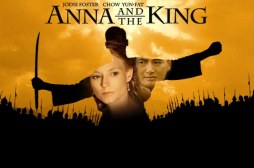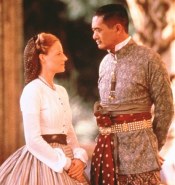| Anna and the King |
| |
 |
USA, 1999. Rated PG-13. 140
minutes.
Cast: Jodie Foster, Chow Yun-Fat,
Bai Ling, Tom Felton, Syed Alwi, Keith Chin, Randall Duk Kim, Lim Kay-Siu,
Melissa Campbell, Deanna Yusoff
Writers: Steve Meerson & Peter Krikes, based on the diaries
by Anna Leonowens
Music: George Fenton
Cinematographer: Caleb Deschanel
Producers: Lawrence Bender & Ed Elbert
Director: Andy Tennant
LINKS
|
 n
a year characterized by inventive, groundbreaking movies like American
Beauty, Being John Malkovich, The
Blair Witch Project, and Fight Club,
Anna and the King stands out. It stands out as a big traditional Hollywood
epic. Giant sets, huge cast, expensive costumes, omnipresent score, and plenty
of contrived made-for-the-movies moments... Anna and the King has it
all. This is the sort of film that would have contended for a Best Picture Oscar
back in the mid-Eighties and handily won in the early Sixties. But this is the
late Nineties, and traditional Hollywood epics are pretty unfashionable now.
It would seem an ill-considered time, therefore, to produce the fourth screen
adaptation of the true-ish story of Anna Leonowens, who in the 1860s spent five
years teaching English in the court of Siam. Everything about this now-classic
fairy-tale romance clashes with the subversive, counter-cultural aesthetic currently
dominating at the box office.
n
a year characterized by inventive, groundbreaking movies like American
Beauty, Being John Malkovich, The
Blair Witch Project, and Fight Club,
Anna and the King stands out. It stands out as a big traditional Hollywood
epic. Giant sets, huge cast, expensive costumes, omnipresent score, and plenty
of contrived made-for-the-movies moments... Anna and the King has it
all. This is the sort of film that would have contended for a Best Picture Oscar
back in the mid-Eighties and handily won in the early Sixties. But this is the
late Nineties, and traditional Hollywood epics are pretty unfashionable now.
It would seem an ill-considered time, therefore, to produce the fourth screen
adaptation of the true-ish story of Anna Leonowens, who in the 1860s spent five
years teaching English in the court of Siam. Everything about this now-classic
fairy-tale romance clashes with the subversive, counter-cultural aesthetic currently
dominating at the box office. 
The most famous of the prior adaptations (which included 1946's Anna and
the King of Siam and this year's animated feature The King and I)
was, of course, the intolerably racist 1956 film version of the Rodgers and
Hammerstein 1951 musical, The King and I. It made Yul Brenner a star
and earned him one of the most inexplicable Best Actor Oscars®
ever awarded for his broad, ham-handed portrayal of King Mongkut. Although censorship
is always regrettable, one can hardly blame the Thais for banning The King
and I from their homeland. Its historical accuracy is gravely in doubt.
It's not just that The King and I would have you believe that mid-19th
Century Siamese were given to breaking out into middlebrow American song-and-dance
numbers at the drop of a hat. It's that it depicts Mongkut--by all accounts
an intelligent and progressive ruler for his time--as a buffoon. And it takes
Anna Leonowens' memoirs at their word, though many historians agree that she
lied extensively about her background and exaggerated her own position and importance
in King Mongkut's court. (See, Louis and the King of Siam, by Dr. W.S.
Bristowe; Anna Leonowens: A Life Beyond 'The King and I,' by Leslie Smith
Dow, and the article by William Warren in Traveller's Tales-Thailand.)
Although Anna and the King, too, is of questionable historical merit,
it is a far more plausible and culturally sensitive telling of the story of
Anna and Mongkut. We first meet Anna (Jodie Foster) in 1862 as she arrives in
Bangkok with her son Louis. She's newly widowed and determined to make the best
of her new life as a teacher of English to Mongkut's eldest son and heir to
the throne, Chulalongkorn. Full of confidence, she tells Louis that the ways
of England are the ways of the world. She is ill-prepared, however, for the
reality of Mongkut's court. She is assigned quarters in the palace upon her
arrival (despite Mongkut's promise to give her a house of her own) and subsequently
ignored. But Anna's quintessential Englishness refuses to allow her to accept
the Siamese "everything in its own time" way of doing things. After three weeks
of neglect, she barges into the throne room and forces an audience with Mongkut.
In Mongkut (Chow Yun-Fat), Anna's stubbornness and determination meet
their match. Unlike his courtiers, Mongkut takes in stride Anna's refusal
to abase herself and her forwardness--particularly unseemly in a woman.
He greets Anna with phlegmatic composure, which has the effect of taking
the wind out of Anna's sails more effectively than any display of anger
or dissatisfaction might have. Brushing aside her request for quarters
outside of the palace, he introduces Anna to his multitude of wives, concubines,
and children, and he informs Anna that Chulalongkorn will not be her only
pupil. Anna will be required to teach all the royal offspring.
These first few scenes between Anna and Mongkut are important because they
help to establish the difference between influence and control. In previous
film adaptations, Anna proves able to manipulate Mongkut; here, the dynamic
is altered. Later in the story, when Anna and the King shows Mongkut
taking Anna's advice and treating her as an equal, as we know he eventually
will, we see that it is because he is choosing to do so, not because of Anna's
ability to steamroll him. Anna and the King is not a story about
a plucky Englishwoman who civilizes a headstrong king. There is never any doubt
about who is in charge. 
Instead, the struggle to be in charge takes place between Anna and Chulalongkorn
(Keith Chin). He refuses to be told what to do by a woman--and a foreign
woman, to boot. He defies Anna and starts a fistfight with Louis. But Anna's
more strong-willed than Chulalongkorn bargains for, and, with a judiciously
timed show of support for Anna by Mongkut, the battle is won.
The film's attention then shifts to slavery, an issue which The King and
I chose as its central focus. Anna discovers that some of the servants in
the palace are being treated abominably, and, as Anna gets to know the King's
family, it becomes clear to her that the wives are little more than slaves themselves.
Although the film's views on slavery, expressed through an angry Anna, are not
subtly presented, Anna and the King is not quite as heavy-handed as The
King and I. We are thankfully spared the latter film's painful ten-minute-plus
musical rendition of Uncle Tom's Cabin by the king's children. Further,
Anna and the King is more realistic about cultural and social limitations
on change, no matter how forward thinking a monarch might be. On the other hand,
after it is so forcefully introduced by the screenwriters, the issue of slavery
is ultimately and unsatisfactorily glossed over and forgotten.
The political subplot involving Siam's efforts to avoid becoming a European
colony is far more prominent than in The King and I and dominates
the last quarter of the film. We learn that Mongkut desires the royal family
to learn English, not because he views Siam as a backward nation that must be
more "modern" (i.e., more European), but because he knows that Britain
is the world's preeminent colonial power. Mongkut also knows that preserving
Siam's independence from Britain (or France) will not be easy--especially because
there have been reports of border raids by Burmese soldiers, and Burma is a
British protectorate. Mongkut suspects the Burmese of trying to provoke a war
in order to prompt British intervention against Siam, so being perceived as
pro-English is politic. All of this makes perfect sense, but at a certain point
the political intrigue stops being realistic. The last part of the film, in
which the royal court flees Bangkok for reasons that make little sense (the
journey turns out to be predictably foolhardy), is quite obviously a Hollywood
screenwriter's creation. It's a shame that the movie's quest for realism is
abandoned in favor of incorporating more action and a good-old-fashioned climactic
scene.
AboutFilm.Com
The Big Picture
|
| Alison |
-
|
| Carlo |
B
|
| Dana |
B-
|
| Jeff |
B-
|
| Kris |
-
|
| ratings explained |
The movie works in spite of its obvious Hollywoodisms, thanks to its gorgeous
production and its fine stars--one of the two stars in particular. I do not
mean Jodie Foster. She is an outstanding actress, but she has one fatal limitation,
and that is her lack of chemistry with male co-stars, as anyone who has seen
Sommersby is well aware. One could argue that she had chemistry with
Mel Gibson in Maverick, primarily due to her willingness to play along
with Gibson's brand of humor. She certainly had chemistry with Anthony Hopkins,
but The Silence of the Lambs was
not precisely a romance. Foster just doesn't generate much warmth on screen.
Fortunately, Foster's inability to portray romantic love does not undo the
movie, for two reasons. First, Foster handles the rest of the emotional range
superbly, which serves her well because the romance between Anna and Mongkut
is largely of the frustrated, unrequited variety. She is thus asked to display
anger, pain, vulnerability, and confusion instead of passion, and that she can
do. Second, Chow Yun-Fat has enough chemistry and warmth for the both of them.
A former icon of Hong Kong cinema (The Killer, Hard
Boiled, Bullet in the Head), Chow Yun-Fat is a star--in the classic
sense of the word. American audiences may not be aware of Yun-Fat's box office
power, but his star quality is immediately apparent. He fills the screen with
his magnetism and charisma. When he is onscreen, he commands it--just as a king
should. You might have trouble believing that Foster is in love based on her
own performance, but Yun-Fat's charisma makes it believable. And even though
he has spent most of his career making action movies, Yun-Fat is surprisingly
at ease in a period piece. While he may not contend for a Best Actor Oscar,
he proves that he has dramatic skills to back up his star quality. Longtime
Yun-Fat fans will also be pleased to find that director Andy Tennant (Ever
After, another star-crossed romance between opposites) even allows him to
indulge in a classic Yun-Fat moment: he coolly lights a cigar as he stares danger
in the face.
Anna and the King is a nice story, but even this more historically accurate
version is probably mostly fiction. The idea of a relationship, requited or
no, between Anna and Mongkut is improbable at best. For one thing, the real
Mongkut was about 58 years old when the twenty-eight-old Anna (thirty-one by
some accounts) arrived in Bangkok. For another, most historians dispute the
importance of her role in King Mongkut's court. They also allege that the entire
episode involving Mongkut's treatment of his youngest wife, Tuptim (Bai Ling),
was completely invented by Anna Leonowens for the purpose of adding color to
her adventures. Still, just because Anna and the King is not accurate
doesn't mean it's not entertaining. Visually, the film is spectacular, and except
for the last part, the story holds together reasonably well. If you are starved
for a classic Hollywood epic, you should make a point of seeing Anna and
the King.
Review
© December 1999 by AboutFilm.Com and the author.
Images © 1999 Fox and its related entities. All rights reserved.



